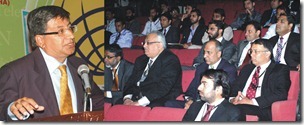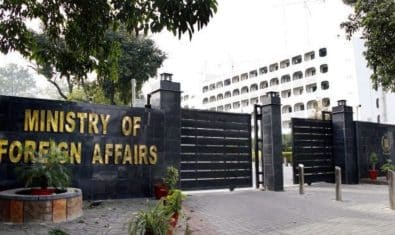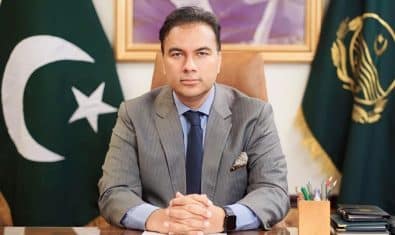Pakistan’s annual telecom and IT event, the 4TH Pakistan Telecommunication Conference (TeleCON 2011) concluded today at the Islamabad Club.
Organized in collaboration with the Pakistan Telecommunication Authority (PTA) and the Pakistan Software Houses Association (P@SHA), the conference recommended that it was time for Pakistan to deploy eco-sustainable technologies to enhance communication and usher robust economic growth.
Muhammad Yaseen, Chairman PTA in his keynote address before the start of the day-long meeting stressed,
“Broadband is considered as the next big thing to offer a unifying services platform for three converging industrial sectors: computing, communications and broadcasting.
Encouraging developments are happening in this sector since mid-2007, Pakistan has emerged as a lucrative market for broadband service providers owing to the huge potential it offers especially in the wireless broadband market. We observed a profound evolution of broadband technologies over the years with the present subscription base reaching 1.2 million from 0.1 million in 2007.”
According to United Nations Conference on Trade and Development (UNCTAD) latest report on Information Economy Report, Pakistan is among the five dynamic economies of developing Asia in terms of increased penetration of mobile phones, Internet and broadband.
He added,
“I strongly believe that this is not the end; it is a new beginning of reaping the associated business, entrepreneurship and social benefits of this exponential ICT infrastructure.
As today we are going to deliberate on potential new technologies and economic challenges, I certainly feel quite contended that this promising regime in Pakistan’s economy will continue bringing in substantial revenues and creating remarkable job opportunities.”

“A powerful telecommunications infrastructure has proved to be the key for robust growth in many countries during recent times.
Over the past two decades, Pakistan has been very proactive in deploying modern technology in this arena; however the quest of delivering the next-generation of cellular services has become a complex debate for the industry.
In the opening session on “Regulatory – Technology and Economic Challenges”, Adil Rauf, CEO, Alcatel-Lucent Technologies, mapping the future of mobile technology said,
“A radical and sustainable approach was needed to meet the eco-sustainability challenges, and announced the company’s ground-breaking mobile technology called ‘Light-Radio’ a simpler, greener, lighter network that saves in infrastructure and energy.”
In his presentation on ‘Technologies and Economic Challenges’, Arif Hussain, Chief Operating officer of Multinet Pakistan, said
“Considerations for technology, economics and opportunities must be the key element in drawing a clearer roadmap for the future of mobile technologies in Pakistan. While technologies were getting bigger, better, cheaper and faster; the investment and ROI, and stability of platform were an equally important factor.”
Dr. Tanveer ul Haq, Chief Technical Officer of Wi-Tribe and Saad Muzaffar Waraich, Country Manager, Nokia-Siemens Network while presenting in the session on “Deployment of 3-G or 4-G Technology” revealed that the real need today was to have access to faster and reliable broadband as consumers were more inclined to video-downloading rather than data sourcing. Both were of the opinion that deployment of 3-G technology in Pakistan was long overdue and should be a priority on the government’s agenda. This session was chaired by Dr. Khawar Siddique Khokhar, Member Technical, PTA who endorsed the view of his chairman citing the need to be cautious in its deployment.
In the session on “Information Technology, Mobile Applications” Usman Tariq of Systems Limited, the country’s oldest and one of the largest IT and ITES companies, with revenues of approx Rs.1.5 billion during 2010, said, “The key areas of mobile applications which included customized packages, mobile games, mobile websites and web-applications, business and marketing applications, were some of the development areas which need to focused on.” Citing the example of the success of mobile banking in Pakistan, Usman said that companies with the best breed of software technologies and business process outsourcing solutions were in a better position to progress in the mobile applications arena.
The conference ended on a high note in the Panel Discussion chaired by Mr. Irfan Nadeem, Federal Secretary, Ministry of Science & Technology which centered on “Global Telecom and IT Trends – the Pakistan Model”. Prof. Dr. Arshad Ali, Director-General, NUST School of Engineering & Computer Sciences and Shehryar Hyderi, Chief Operating Officer of Trango Interactive, with the active participation of delegates in the audience dilated on the need for providing R&D support to developers and small companies enabling them to compete particularly in the local gaming markets where there was scope and talent. Shehryar’s viewpoints on the potential of the gaming industry in Pakistan drew wide acclaim and opened new doors of opportunities for the developer-community.


























